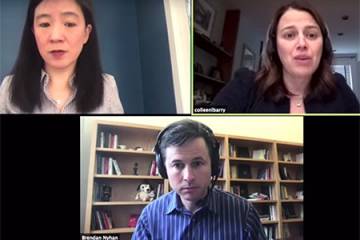Political scientist Yascha Mounk opened Friday's conversation about the "deep moral tradeoffs that face us" during the COVID-19 pandemic by asking whether Americans truly have to choose between saving the economy and saving lives.
Danielle Allen, who directs Harvard's Emond J. Safra Center for Ethics, rejected that very line of thought. Rather than framing it within "conventional cost-benefit analysis," she said, consider the pandemic a double "existential threat"—to our core institutions and, by consequence, our economy.
"Think of yourself as being on a war footing, where … you need to mobilize all of your resources, including the economy, to fend those off," Allen said. "You can't fight any war without a functioning economy. So in that regard, saving the economy is actually a part of saving lives. These things go together, and the job is to figure out how to integrate a policy pathway that permits success in relationship to both existential threats."
Allen suggested that a way forward for reopening the economy safely would involve "tools of disease control just as powerful as collective quarantine without the economic costs": extensive COVID-19 testing, contact tracing, and the isolation of infectious people.
Mounk, senior fellow at the Stavros Niarchos Foundation Agora Institute at Johns Hopkins, led Friday's conversation with Allen and Johns Hopkins political science Professor Robert Lieberman. The three distinguished political science scholars discussed questions of civil liberties, ethics, and policy amid COVID-19 as part of SNF Agora Institute's ongoing conversation series.
Video credit: SNF Agora Institute at Johns Hopkins
Mounk said that three conditions must apply to any measures governments take to combat the pandemic: they must be "democratically legitimated," they must be temporary, and they must be "strictly necessitated to save lives."
Lieberman noted that historical precedent supports the second condition. "There is a history of leaders, even democratically elected leaders, using these moments of crisis and even moments of emergency, to ratchet up their authority, their power, their control of society, and then when the emergency passes, not necessarily letting those controls lapse," he said. "We have to guard against it."
Allen put a finer point on Mounk's third point on the goal of saving lives: "We're not going to save every single life here. I will go ahead and say that," she said. "But what we want is a context in which people can make reasonable decisions about their own safety, in the face of a reasonable risk situation."
Posted in Voices+Opinion, Politics+Society
Tagged politics, ethics, snf agora institute, yascha mounk, covid-19









